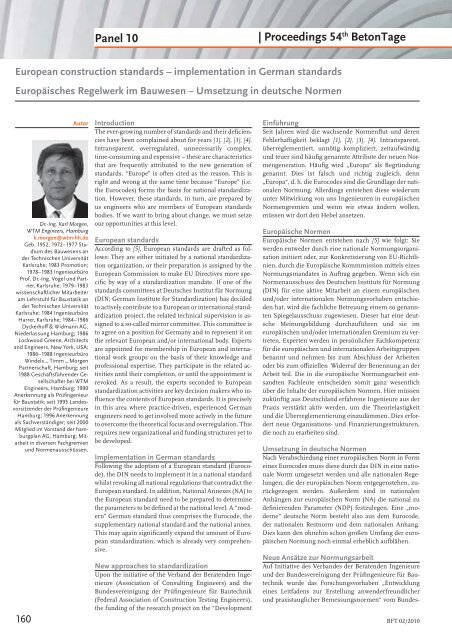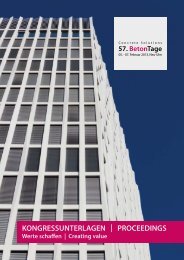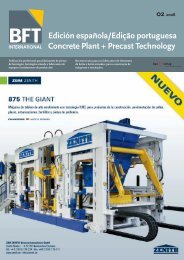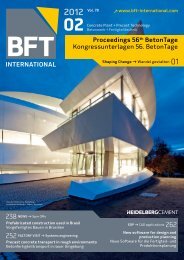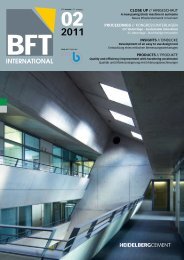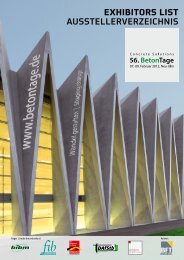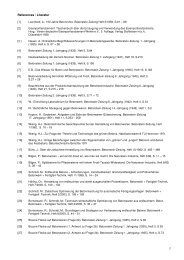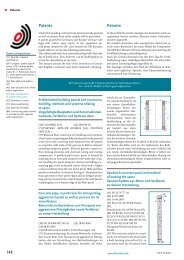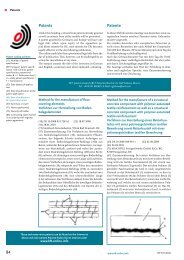Concrete Plant + Precast Technology Betonwerk ... - BFT International
Concrete Plant + Precast Technology Betonwerk ... - BFT International
Concrete Plant + Precast Technology Betonwerk ... - BFT International
Sie wollen auch ein ePaper? Erhöhen Sie die Reichweite Ihrer Titel.
YUMPU macht aus Druck-PDFs automatisch weboptimierte ePaper, die Google liebt.
160<br />
Panel 10<br />
| Proceedings 54 th BetonTage<br />
European construction standards – implementation in German standards<br />
Europäisches Regelwerk im Bauwesen – Umsetzung in deutsche Normen<br />
Autor<br />
Dr.-Ing. Karl Morgen,<br />
WTM Engineers, Hamburg<br />
k.morgen@wtm-hh.de<br />
Geb. 1952; 1972–1977 Studium<br />
des Bauwesens an<br />
der Technischen Universität<br />
Karlsruhe; 1983 Promotion;<br />
1978–1983 Ingenieurbüro<br />
Prof. Dr.-Ing. Vogel und Partner,<br />
Karlsruhe; 1979–1983<br />
wissenschaftlicher Mitarbeiter<br />
am Lehrstuhl für Baustatik an<br />
der Technischen Universität<br />
Karlsruhe; 1984 Ingenieurbüro<br />
Harrer, Karlsruhe; 1984–1986<br />
Dyckerhoff & Widmann AG,<br />
Niederlassung Hamburg; 1986<br />
Lockwood Greene, Architects<br />
and Engineers, New York, USA;<br />
1986–1988 Ingenieurbüro<br />
Windels _ Timm _ Morgen<br />
Partnerschaft, Hamburg; seit<br />
1988 Geschäftsführender Gesellschafter<br />
bei WTM<br />
Engineers, Hamburg; 1990<br />
Anerkennung als Prüfi ngenieur<br />
für Baustatik; seit 1995 Landesvorsitzender<br />
der Prüfi ngenieure<br />
Hamburg; 1996 Anerkennung<br />
als Sachverständiger; seit 2000<br />
Mitglied im Vorstand der hamburgplan<br />
AG, Hamburg; Mitarbeit<br />
in diversen Fachgremien<br />
und Normenausschüssen.<br />
Introduction<br />
The ever-growing number of standards and their defi ciencies<br />
have been complained about for years [1], [2], [3], [4].<br />
Intransparent, overregulated, unnecessarily complex,<br />
time-consuming and expensive – these are characteristics<br />
that are frequently attributed to the new generation of<br />
standards. “Europe” is often cited as the reason. This is<br />
right and wrong at the same time because “Europe” (i.e.<br />
the Eurocodes) forms the basis for national standardization.<br />
However, these standards, in turn, are prepared by<br />
us engineers who are members of European standards<br />
bodies. If we want to bring about change, we must seize<br />
our opportunities at this level.<br />
European standards<br />
According to [5], European standards are drafted as follows:<br />
They are either initiated by a national standardization<br />
organization, or their preparation is assigned by the<br />
European Commission to make EU Directives more specifi<br />
c by way of a standardization mandate. If one of the<br />
standards committees at Deutsches Institut für Normung<br />
(DIN; German Institute for Standardization) has decided<br />
to actively contribute to a European or international standardization<br />
project, the related technical supervision is assigned<br />
to a so-called mirror committee. This committee is<br />
to agree on a position for Germany and to represent it on<br />
the relevant European and/or international body. Experts<br />
are appointed for membership in European and international<br />
work groups on the basis of their knowledge and<br />
professional expertise. They participate in the related activities<br />
until their completion, or until the appointment is<br />
revoked. As a result, the experts seconded to European<br />
standardization activities are key decision makers who infl<br />
uence the contents of European standards. It is precisely<br />
in this area where practice-driven, experienced German<br />
engineers need to get involved more actively in the future<br />
to overcome the theoretical focus and overregulation. This<br />
requires new organizational and funding structures yet to<br />
be developed.<br />
Implementation in German standards<br />
Following the adoption of a European standard (Eurocode),<br />
the DIN needs to implement it in a national standard<br />
whilst revoking all national regulations that contradict the<br />
European standard. In addition, National Annexes (NA) to<br />
the European standard need to be prepared to determine<br />
the parameters to be defi ned at the national level. A “modern”<br />
German standard thus comprises the Eurocode, the<br />
supplementary national standard and the national annex.<br />
This may again signifi cantly expand the amount of European<br />
standardization, which is already very comprehensive.<br />
New approaches to standardization<br />
Upon the initiative of the Verband der Beratenden Ingenieure<br />
(Association of Consulting Engineers) and the<br />
Bundesvereinigung der Prüfi ngenieure für Bautechnik<br />
(Federal Association of Construction Testing Engineers),<br />
the funding of the research project on the “Development<br />
Einführung<br />
Seit Jahren wird die wachsende Normenfl ut und deren<br />
Fehlerhaftigkeit beklagt [1], [2], [3], [4]. Intransparent,<br />
überreglementiert, unnötig kompliziert, zeitaufwändig<br />
und teuer sind häufi g genannte Attribute der neuen Normengeneration.<br />
Häufi g wird „Europa“ als Begründung<br />
genannt. Dies ist falsch und richtig zugleich, denn<br />
„Europa“, d. h. die Eurocodes sind die Grundlage der nationalen<br />
Normung. Allerdings entstehen diese wiederum<br />
unter Mitwirkung von uns Ingenieuren in europäischen<br />
Normengremien und wenn wir etwas ändern wollen,<br />
müssen wir dort den Hebel ansetzen.<br />
Europäische Normen<br />
Europäische Normen entstehen nach [5] wie folgt: Sie<br />
werden entweder durch eine nationale Normungsorganisation<br />
initiiert oder, zur Konkretisierung von EU-Richtlinien,<br />
durch die Europäische Kommmission mittels eines<br />
Normungsmandates in Auftrag gegeben. Wenn sich ein<br />
Normenausschuss des Deutschen Instituts für Normung<br />
(DIN) für eine aktive Mitarbeit an einem europäischen<br />
und/oder internationalen Normungsvorhaben entschieden<br />
hat, wird die fachliche Betreuung einem so genannten<br />
Spiegelausschuss zugewiesen. Dieser hat eine deutsche<br />
Meinungsbildung durchzuführen und sie im<br />
europäischen und/oder internationalen Gremium zu vertreten.<br />
Experten werden in persönlicher Fachkompetenz<br />
für die europäischen und internationalen Arbeitsgruppen<br />
benannt und nehmen bis zum Abschluss der Arbeiten<br />
oder bis zum offi ziellen Widerruf der Benennung an der<br />
Arbeit teil. Die in die europäische Normungsarbeit entsandten<br />
Fachleute entscheiden somit ganz wesentlich<br />
über die Inhalte der europäischen Normen. Hier müssen<br />
zukünftig aus Deutschland erfahrene Ingenieure aus der<br />
Praxis verstärkt aktiv werden, um die Theorielastigkeit<br />
und die Überreglementierung einzudämmen. Dies erfordert<br />
neue Organisations- und Finanzierungsstrukturen,<br />
die noch zu erarbeiten sind.<br />
Umsetzung in deutsche Normen<br />
Nach Verabschiedung einer europäischen Norm in Form<br />
eines Eurocodes muss diese durch das DIN in eine nationale<br />
Norm umgesetzt werden und alle nationalen Regelungen,<br />
die der europäischen Norm entgegenstehen, zurückgezogen<br />
werden. Außerdem sind in nationalen<br />
Anhängen zur europäischen Norm (NA) die national zu<br />
defi nierenden Parameter (NDP) festzulegen. Eine „moderne“<br />
deutsche Norm besteht also aus dem Eurocode,<br />
der nationalen Restnorm und dem nationalen Anhang.<br />
Dies kann den ohnehin schon großen Umfang der europäischen<br />
Normung noch einmal erheblich aufblähen.<br />
Neue Ansätze zur Normungsarbeit<br />
Auf Initiative des Verbandes der Beratenden Ingenieure<br />
und der Bundesvereinigung der Prüfi ngenieure für Bautechnik<br />
wurde das Forschungsvorhaben „Entwicklung<br />
eines Leitfadens zur Erstellung anwenderfreundlicher<br />
und praxistauglicher Bemessungsnormen“ vom Bundes-<br />
<strong>BFT</strong> 02/2010


